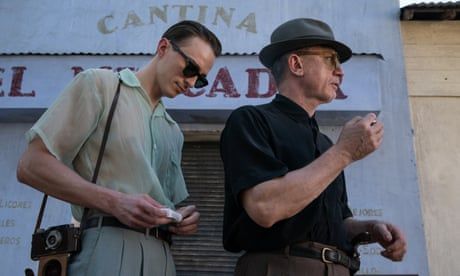
The Call Me by Your Name director’s overlong William Burroughs adaptation boasts some fine performances, but any gritty realism feels totally manicured
The writing of William Burroughs is not for everyone. But even his detractors would agree that he was not in the business of prettification. His loosely autobiographical satires – Junkie, for example, or the novella Queer, which forms the basis for this film – embrace the brutish ugliness of base and animalistic urges. His was a defiantly unsavoury writing voice – prose that was rotten with self-loathing and reeking of stale beer sweat. Whatever else, it came from a place of unvarnished personal truth and authenticity. All of which makes the incongruous approach of Italian director Luca Guadagnino (Suspiria; Call Me by Your Name) to this sprawling adaptation of Burroughs’s self-lacerating 1985 story of obsession, addiction and burnout such a tonally jarring misfire.
Admittedly, the film talks the talk, with Burroughs’s words brought to bullish life by Daniel Craig’s ripe performance as William Lee, Burroughs’s alter ego and an American expat in 1950s Mexico City, who spends his time trawling the bars, bleary with tequila and sloppy with lust. Craig is terrific, delivering a wholly committed, vanity-free turn that weaves between swaggering self-importance and a complete lack of dignity. But his performance is continually undermined by the arch artificiality of the film’s design. Shot largely on a set constructed at Rome’s Cinecittà studios, the whole look of the picture screams phoniness. Obvious cinematic fakery isn’t always a problem; I adored Yorgos Lanthimos’s Poor Things, which might have been shot inside a giant snowglobe for all the effort it made to embrace realism. But for Burroughs’s worlds, all grit and spit and blood and bitterness, you need a backdrop smeared with the fingerprints of the past inhabitants; a sense that the streets have been lived in, slept and occasionally died on.
Continue reading...